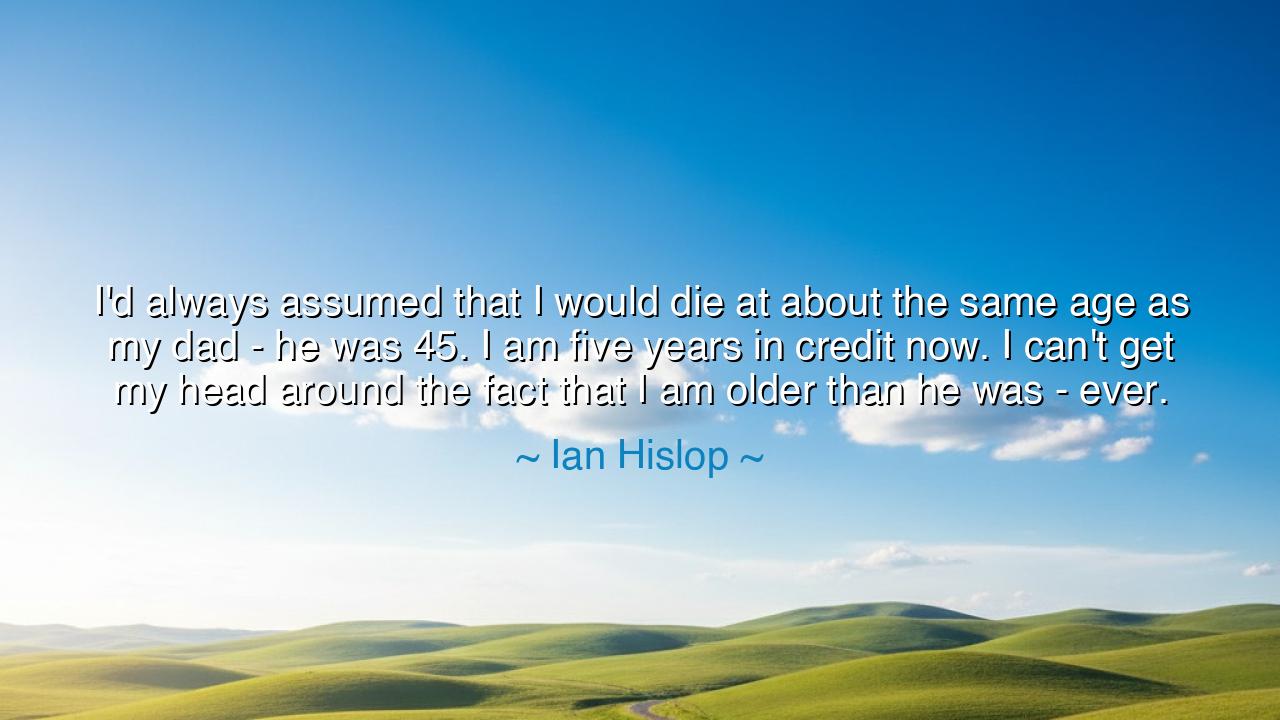
I'd always assumed that I would die at about the same age as my
I'd always assumed that I would die at about the same age as my dad - he was 45. I am five years in credit now. I can't get my head around the fact that I am older than he was - ever.






The words of Ian Hislop — “I'd always assumed that I would die at about the same age as my dad — he was 45. I am five years in credit now. I can't get my head around the fact that I am older than he was — ever” — reveal the tender paradox of life and time: that every generation lives beneath the shadow and blessing of those who came before. In his reflection, there is both gratitude and bewilderment — a man standing beyond the years his father was granted, feeling as though he walks upon borrowed time. These words are not simply about age or mortality; they are about the inheritance of life, the silent echo of love and loss that shapes one’s sense of being.
Born from Hislop’s own experience of losing his father at a young age, this quote carries the weight of memory and the strange mathematics of the heart — where years are not counted by clocks, but by connection. For the child who loses a parent early, time itself becomes haunted; each passing year is not just another step forward, but a trespass into the unknown, a realm the parent never reached. To live beyond the years of one’s father is to feel both triumphant and guilty — to stand on the far side of a line once thought unbreakable. In this way, Hislop’s words speak for all who have outlived those they once looked up to as immortal.
The ancients, too, spoke of such reckonings. The Greek philosopher Heraclitus said that no man steps into the same river twice — that life flows endlessly onward, even as we cling to the banks of memory. Yet, when the river carries us past the point where our ancestors once stood, we look back and feel the distance of mortality more keenly than ever. For to surpass the age of a lost parent is not merely to live longer; it is to enter a landscape they never walked, to breathe air they never tasted, and to realize that time — which once united you — now divides you.
There is a profound humility in Hislop’s phrase “five years in credit.” It suggests not ownership of life, but gratitude for it — as though each day were a gift lent, not owed. This way of thinking transforms time into something sacred. The ancient Stoics, like Marcus Aurelius, taught that we must live as though every dawn were a favor from the gods, undeserved yet precious. To wake and find oneself still alive is to be reminded of the brevity of the human flame. Hislop’s reflection embodies this awareness: that every breath beyond what was expected is not routine, but miraculous.
And yet, there is also sorrow. The child who outlives the parent carries an invisible ache — the knowledge that the one who gave them life did not receive the same abundance. Many who walk this path feel a sense of dislocation — of being older than the memory they hold. The father, forever frozen in youth, becomes a figure in amber; while the son, growing older, must learn to be both man and memory-keeper. It is a strange inheritance — to carry forward what another could not finish, to become older than the one who once seemed eternal.
History gives us countless examples of those who lived “beyond their lineage.” The painter Vincent van Gogh lost his father young, and for years believed that he too would die early. When he lived past his father’s age, he wrote to his brother Theo that he felt as though he had crossed into “borrowed years.” His art from that period carries a deeper urgency, as though he painted not to preserve his life, but to honor the time he had been given. So too with Hislop — though his words are not painted in oil, they are colored by the same awareness: that to live longer than one’s father is not to escape mortality, but to understand its mystery.
Let this then be the lesson we draw from Hislop’s reflection: that time is not a measure of quantity, but of meaning. To live “in credit” is not merely to count the years we survive, but to fill them with gratitude, remembrance, and purpose. Let each of us who has outlived another live for them — to do the things they could not, to love more deeply, to forgive more freely, and to leave behind something worthy of their memory. For one day, others will measure their time by ours.
Thus, remember Hislop’s words not as melancholy, but as sacred truth: to live beyond the years of those we love is not just to live longer, but to live more wisely. Each dawn becomes a continuation of their story, and every act of kindness, courage, or creation is a way of saying to them across the distance of time — I have not forgotten, and I live on for both of us.






AAdministratorAdministrator
Welcome, honored guests. Please leave a comment, we will respond soon